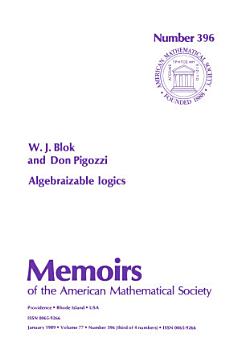Algebraizable Logics
W. J. Blok · Don Pigozzi
ม.ค. 1989 · American Mathematical Soc.
eBook
78
หน้า
reportคะแนนและรีวิวไม่ได้รับการตรวจสอบยืนยัน ดูข้อมูลเพิ่มเติม
เกี่ยวกับ eBook เล่มนี้
W. J. Blok and Don Pigozzi set out to try to answer the question of what it means for a logic to have algebraic semantics. In this seminal book they transformed the study of algebraic logic by giving a general framework for the study of logics by algebraic means. The Dutch mathematician W. J. Blok (1947-2003) received his doctorate from the University of Amsterdam in 1979 and was Professor of Mathematics at the University of Illinois, Chicago until his death in an automobile accident. Don Pigozzi (1935- ) grew up in Oakland, California, received his doctorate from the University of California, Berkeley in 1970, and was Professor of Mathematics at Iowa State University until his retirement in 2002. The Advanced Reasoning Forum is pleased to make available in its Classic Reprints series this exact reproduction of the 1989 text, with a new errata sheet prepared by Don Pigozzi.
ให้คะแนน eBook นี้
แสดงความเห็นของคุณให้เรารับรู้
ข้อมูลในการอ่าน
สมาร์ทโฟนและแท็บเล็ต
ติดตั้งแอป Google Play Books สำหรับ Android และ iPad/iPhone แอปจะซิงค์โดยอัตโนมัติกับบัญชีของคุณ และช่วยให้คุณอ่านแบบออนไลน์หรือออฟไลน์ได้ทุกที่
แล็ปท็อปและคอมพิวเตอร์
คุณฟังหนังสือเสียงที่ซื้อจาก Google Play โดยใช้เว็บเบราว์เซอร์ในคอมพิวเตอร์ได้
eReader และอุปกรณ์อื่นๆ
หากต้องการอ่านบนอุปกรณ์ e-ink เช่น Kobo eReader คุณจะต้องดาวน์โหลดและโอนไฟล์ไปยังอุปกรณ์ของคุณ โปรดทำตามวิธีการอย่างละเอียดในศูนย์ช่วยเหลือเพื่อโอนไฟล์ไปยัง eReader ที่รองรับ





